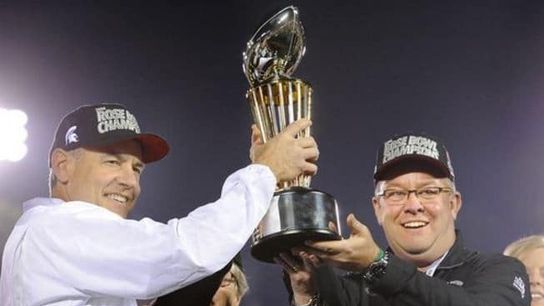The importance of a good relationship between a head coach and his athletic director cannot be overstated. Every year we seem to hear about a strained relationship between a coach and his athletic director, and this past fall's saga between Les Miles and Joe Alleva at LSU is a prime example. At the high school level, there are similar stories scattered across America.
If you take a look at the most successful head coaches in your state or area, chances are pretty good that they have a great relationship with their athletic director. At the college level there are a number of great modern day examples, including Mark Dantonio and Mark Hollis at Michigan State, Hugh Freeze and Ross Bjork at Ole Miss, Bret Bielema and Jeff Long at Arkansas, and Nick Saban and Bill Battle at Alabama, just to name a few.
If you're an aspiring head coach, below are a handful of things you should be looking for as you interview with your potential boss. And if you're already a head coach, here are several things you can look for to ensure a solid, lasting relationship with your AD.
1) Leadership
While the head coach is the face of the football program, the athletic director serves as the face of the entire school's athletic department so while they share many of the same objectives, the athletic director needs to be the one providing the final say on matters. When adversity hits the program, the head coach needs to be able to go to the AD with questions, concerns, and advice and the athletic director needs to be someone that can provide the direction to get (or keep) things on track. Leadership also means being strong in areas like organization, motivation, integrity, and a number of other areas as well.
2) Support
As a head coach, different issues are bound to arise during the course of a season and it's paramound that as a head coach, you know that your athletic director has your back and isn't going to easily fold to the pressure of parents, or other demographics. A growing number of coaches feel like they're "one parent away from being unemployed," and it's probably safe to say that the coaches saying that don't have the full support of their athletic director. A true open door policy goes a long way in the coach / AD relationship for both parties, and this often results in a lasting, meaningful friendship.
3) Communication
The foundation of any good relationship is communication, and the dymanic between an athletic director and head coach is no different. If the head coach needs to order a dozen new helmets he needs to feel comfortable approaching the AD and asking for it, and if the AD is fielding complaints about one aspect or another of the head coach's program, they have to feel the same open line of communication with their head coach. It goes both ways.
4) A drive to besuccessful
Good athletic directors have a drive to see each and every program under their watch reach their maximum potential, and that means they're committed to hiring the best people, coaches, and teachers to make that happen and will also provide anything within their power to ensure that happens.
5) A shared vision
Normally, when an athletic director hires you for a head coaching spot, they share the same vision for the program that you pitched in the interview. However, that isn't always the case and conflicts in this area can lead to a relationship that deteriorates quickly.
6) The ability to see problems before they arise
The best athletic directors are those who don't simply react to problems to they arise, but rather can see them coming a few steps ahead and are able to get ahead of things, and then prepare their head coaches accordingly. The earlier things can be "nipped in the bud" the less likely they become big issues over time.
7) The ability to see things from outside the AD perspective
Overseeing an entire athletic department can pull an athletic director in a variety of different directions. ADs can be asked for a variety of things that a program feels like they need to be successful, while also having to be conscious of the budget and how granting one program's wish is going to look for other programs with wants and needs. Every once in a while, it could be very advantageous for an athletic director to take off "the AD hat" and look at things from the vantage point of a coach trying to win games while transforming the lives of their players. Many times, athletic directors (especially at the high school level) have prior experience as a coach, so this is easier for those ADs than it may be for someone coming from the corporate world.
Is there something you feel like I overlooked? Feel free to let me know via email at doug@footballscoop.com or via Twitter @CoachSamz
